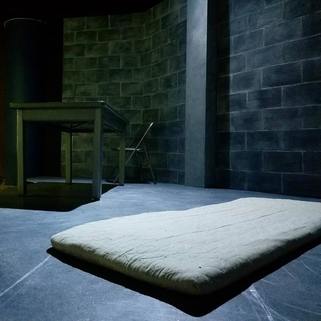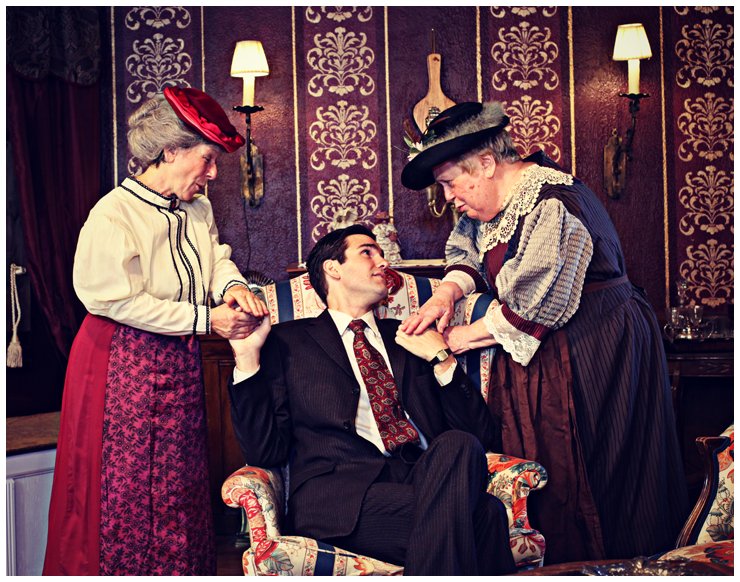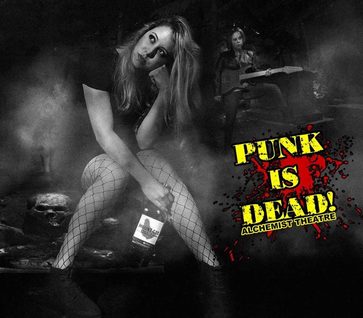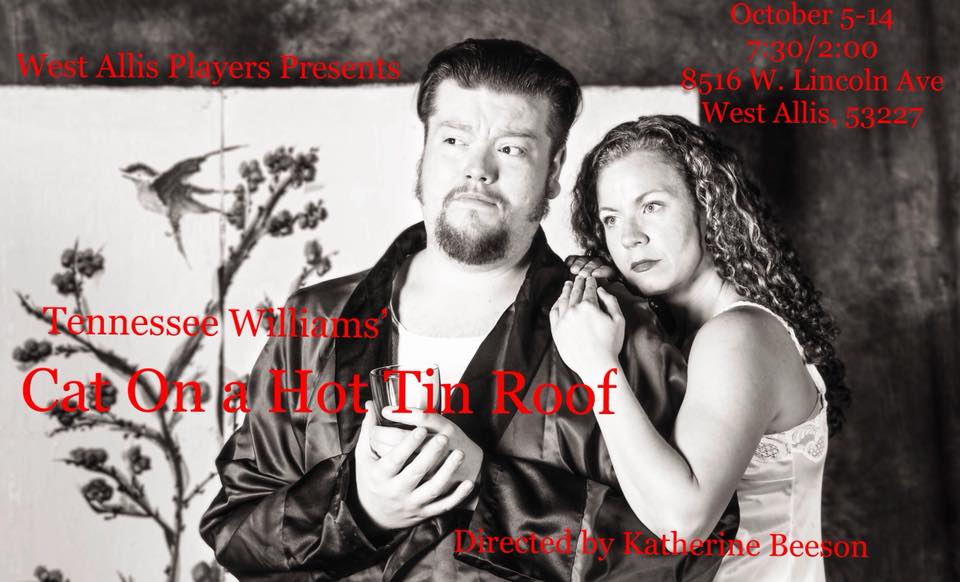|
I’m there in the basement theatre of The Underground Collaborative before the show. The show is Martin McDonagh’s The Pillowman. It’s a dystopian interrogation drama that I’ve seen a couple of times before. No surprises with the script for this one: I already love it. An obscure writer of small fictions is trapped in dystopian shadows being questioned about murders she's only scarcely even heard of. What’s not to love? Something sounding like late ‘80s/early ‘90s metal is playing while people talk about the things people talk about before a show. And I’m sitting alone in front waiting for an interrogation. I’m sitting right in the front row in front of the blindfolded woman onstage playing Katurian. She's firmly entrenched in her character's distinctively brave and patient terror. Rose Grizzell reaches out--blindly feeling an accordion folder on the table in front of her as I take another sip of Yankee Buzzard IPA. An electric guitar riffs through speakers. Katurian fidgets in her own kind of silence. It’s the Underground Collaborative and I’m there with others who have shown-up for the final dress rehearsal. Sarah Harris has really put together a remarkably oppressive set for the show painstakingly draped in minimalist lighting by Ellie Rabinowitz. The table is accompanied by a couple of folding chairs. Everything’s overshadowed by cinderblock walls. There's a section of those walls which pulls-back on a couple of different occasions as the woman playing the writer launches into a couple of stories on a couple of different occasions. I've seen the show done with far less. Yes: the writer Katurian is traditionally played by a guy. McDonagh has been asked. He’s given his blessing on having a woman in the role. Grizzell is crushingly captivating as Katurian. I never recall having seen her before. There are a LOT of great actresses in town. Turns out Grizzell is one of them. I hope I get to see her in more. Of course...I'm not likely to see her in anything quite as close to the center of the stage as Katurian in The Pillowman. So much of the drama hinges on the emotions and revelations of the storyteller. It would really be a dream role for many actors. Grizzell handles it brilliantly. Looks like I have another favorite local actress. A drama like this? All you really need is a card table and some folding chairs. Maybe an old mattress and a pillow. It’s an interrogation drama, so the close quarters of the Underground Collaborative are perfect. This is literally an interrogation in a basement. The sense of oppressive incarceration is deliciously disturbing...especially from the front row. The subtle intricacy of Grizzell’s performance is intellectually engaging. On a number of different occasions, the character is thinking aloud...and Grizzell makes it feel so organic that I almost felt compelled to engage with her in conversation. You really feel trapped in there with her. Especially in the front row. This is such an engrossing production of one of my favorite scripts. Director Jaimelyn Gray has brought everything into the tiny basement space with careful consideration. Really happy to have been able to see this one again. The Constructivists’ production of The Pillowman opens tonight and runs through November 10 at the Underground Collaborative on 161 W. Wisconsin Avenue. For ticket reservations and more, visit the Constructivists online. A full, concise review of the show runs in the next print edition of the Shepherd-Express. ***SUPPLEMENTAL OBSERVATION WITH SPOILERS*** There are only a couple of things in the production that didn’t feel totally authentic to me. One of them turns out to actually cast a really interesting light on the psychology of the two central characters. There’s a physical interaction between Katurian and her brother that...on the surface doesn’t seem at all believable. J.J. Gatesman has done a good job of fight choreography with the diminutive Grizzell and a physically robust Logan Milway (who played Grizzell’s brother.) Watch that scene between Katurian and his brother assuming that everything that you’re seeing is done intentionally. It speaks a great deal about the psychology and emotional interaction between Katurian and her brother. The physical interaction only seems kind of unbelievable until you think about it. There’s a complex interplay between the siblings that has been going on for a long time that finally has a chance to play out in that moment. It’s actually kind of fascinating in retrospect.
0 Comments
Joseph Kesselring’s classic dark comedy Arsenic and Old Lace animates the subterranean stage of the Brumder Mansion for one more weekend this month. Milwaukee Entertainment Group has assembled an impressive cast under the direction of Zach Thomas Woods. Kesselring’s mismatched collection of characters can be a challenge. There’s a killer, a doctor, a theatre. critic, a few cops, a playwright and...quite a lot else. With so many weird and interesting personalities diving around onstage, the overall experience can be unpleasantly disorienting as things crash into each other at odd angles. Woods does a brilliant job of juggling it all on a very small and intimate space. This isn’t just a talented cast. This is a talented cast that’s been given the freedom to embellish each character with a vividly unique personality. Somehow Woods has managed to give the actors room to do this while keeping the overall rhythm of the show moving swiftly from scene to scene. No one crowds out the delightful chaos of the comedy. Gladys Chmiel and Leslie Fitzwater are comically charming as the Brewster sisters--a couple of elderly women living together in an old house. The two actress’ lengthy histories in local theatre are perfectly placed onstage. Their personalities could easily overwhelm everyone else in the ensemble given their rather central placement in the plot, but Chmiel and Fitzwater are engagingly reserved in their approach to the sisters. Milwaukee theatre veteran Tom Marks has a similarly minimalist approach to characterization in a couple of roles around the edges of the ensemble including a priest and the head of a sanitarium. In their retirement, the two sisters take lodgers in their home. This is a production of the show being staged in an ACTUAL historic mansion that’s been turned into a B&B, which lends a great atmosphere to the show. The whole of the Brumder echoes the atmosphere with an organic feel that no stage could match. It’s such a perfect match between venue and play that talk of the sisters’ basement feels pleasantly disorienting on a gut level. Characters talk of a basement in the cozy home of the two sisters...and the show is being staged in the basement of a cozy Brumder. But you walked down the stairs to see them. On the surface, you know where you are (below the surface.) On a gut level, though, it feels like you're on street level. (It's weird.) Joe Picchetti plays the sisters’ nephew Mortimer. It’s been fascinating watching Picchetti’s evolution onstage over the years. I remember seeing the guy in shows at Marquette years ago. There’s a real sophistication that’s settled-into his stage presence. Here he’s working with a very subtle and nuanced exasperated sense of humor. He’s working quite brilliantly with the intimacy of the subterranean stage. Some of the lines are delivered in a subtle murmur to himself that’s somehow clearly audible throughout the basement. Some of his best comedy is almost delivered in a whisper. There aren’t many places where that sort of delivery works, so it’s really, really cool to see Picchetti embrace whispering comedy here. Some of Picchetti’s more aggressive physical comedy is played against Liz Shipe in the role of his girlfriend Elaine Harper. There’s a conservative sweetness about the character that is all too easy to read as simple and demure. Shipe doesn't go for the obvious. From the beginning, Shipe establishes a very dramatically physical presence for Elaine onstage. There’s a comically appealing grace in sudden movements and passionate outbursts that lend a great deal to the production. Rolling into the final week of performances, Shipe seems to have acquired a head cold. How is she able to assert strength and beauty through that head cold? I really have no idea. All I know is that she makes it work. Elaine has that much more assertive strength powering through a head cold in addition to everything else that she has to deal with in her intermittent time onstage. Matthew Ecclestone arrives to complicate things in the role of the killer Jonathan Brewster. Ecclestone has played villains before. He does an exemplary job here. The character is constantly compared to Boris Karloff. Some make-up effects amplify the similarity between Ecclestone and the legendary screen actor. Ecclestone reaches into Karloff’s diction and dramatic delivery to make the similarity that much more palpable...and it does wonders for the character’s sense of menace. Jim Donaldson plays Jonathan’s accomplice Dr. Einstein. Donaldson cuts the harshness of an exaggerated German accent into something cuddly and lovable. The character is compromised...a nice guy caught-up in the brutality of circumstance. Donaldson’s unique stage presence crafts a thoroughly likable character tarnished a bit by the choices life has given him. Sean Duncan is way...WAY over the top in the role of an aging gentleman who believes himself to be Teddy Roosevelt. Duncan’s ridiculously overwhelming approach to the character is kind of essential to stand out amidst the wild spectrum of energies found in the rest of the cast. Also: Duncan is very tall and does not resemble the late president’s short and rather robust figure. A tall, thin guy with vintage glasses, a mustache and a cigar looks kind of overwhelmingly like...Groucho Marx. Duncan’s spot-on exaggeration of Teddy Roosevelt effectively keeps the Groucho at bay while lending a gentle insanity around the edges of the action. And then there are the police. A couple of women serve as police officers who appear early in the story. Tiny Ashley Retzlaff swims in her uniform as Office Brophy. She’s got a really clever grasp of physical comedy...particularly as a frail, gruff little gnome of a man who comes to the house looking for lodging. Danielle Levings is irresistibly gregarious as Officer O’Hara...a policewoman who can’t seem to stop talking about a script for a play that she’s been working on. Adam Qutaishat rounds out the cast in the role of Lieutenant Rooney...a sharp, competent policeman who arrives near the end of the play to help wrap everything up. It’s a full cast. Usually in a show this big, there’s a performance here or there that feels a little lifeless. Not here. In this production, things are only lifeless when they need to be. (There are a couple of corpses that get dragged around a bit.) It’s quite an accomplishment to get a group together that’s this well-articulated in a script that is as good as Arsenic and Old Lace. Productions of Kesselring’s comedy might not be a total rarity, but it’s pretty rare to get a group together that works together this well on so many levels. Milwaukee Entertainment Group’s production of Arsenic and Old Lace runs for one more weekend at the Brumder Mansion on 3046 West Wisconsin Avenue. Tickets are available fort 7:30 performances Thursday Oct. 25 and Friday Oct. 26. (Closing night the 27th is sold out.) For ticket reservations and more, visit Milwaukee Entertainment Group online. Playwright/Director Aaron Kopec fuses a couple of different genres together with the latest in his long-running October "Halloween show" tradition. Punk is Dead is a largely two-person drama that grafts horror and drama together in a story of punk metropolitan madness late in the 20th century. The set is a tiny, little apartment in Manhattan crammed with well-worn artifacts. Various bits and pieces previously seen in the Alchemist bar have been collided together into a space that feels very lived-in. Scenic Designer Evan Crain covers the walls in scrawls in and around the edges of the clutter. Liz Mistele plays Don— a fading punk rocker who is struggling to find meaning at the end of an era. She plays at a dive bar somewhere on the edge of obscurity. She is an addict who can’t find what she’s looking for on a bleary stage and she can’t find what she’s looking in chemical insight either. So she's lost. Natasha Mortazavi is dizzyingly sensual as Don’s lover Stoli— A striking nocturnal figure who is suffering from anterograde amnesia. Unable to form any new memories, she is a phantom locked in a past which is becoming more and more dreamlike as the present bleeds into the future. The interaction between Dona and Stoli is very dark. It’s a very mutually abusive relationship but one that is still somehow mutually beneficial for the both of them. There is the weight of a tremendous amount of negativity weighing over both of them. They’re both battling demons that are much bigger than anything that could possibly fit on stage. Mistele and Mortazavi do a good job of keeping the dynamic between the two characters interesting without letting up on the restless darkness that they are both totally immersed in. Relax: there ARE moments of levity. Michael Christopher plays an acquaintance who accidentally stumbles into the lives of the two women. Christopher reacts with comically wide-eyed bewilderment to everything going on between the two women. He really just wants to get to work, but he has fallen into a particularly bad moment for the two lovers. Michael Christopher also plays into one of the more casually innovative moments in the production. Live theatre can appeal to the senses in a way nothing else can. It can be really difficult to embrace the full potential of theatre beyond the confines of most scripts. It’s difficult to engage in the full sensuality of a show without making it feel weird and gimmicky. Occasionally it works. Occasionally you’ll get a live production that appeals to the senses in a way that no other form of drama could. There might be a scent of perfume or cigarettes. Maybe actors are eating actual food in character. Or maybe Randall T. Anderson is relating to an audience the story behind a drink they’re about to have. (I still love his Bartender show.) In this case Kopec has managed to find a rather clever way to deliver part of a story sound alone. With all the lights briefly out, all that’s going on in the play is manifest directly through sound. The lights come up moments later. It’s not exactly clear what happened on the dark, but we have some idea based on the way Christopher is reacting to Mortazavi. It’s a really clever bit of storytelling that amplifies the mystery of what’s going on. Kopec’s put together a really interesting story that hits countless themes that he had explored in the past: the nature of art and reality, dominance and submission, death and rebellion and so on. Real accomplishment here seems to be how seamlessly the supernatural is fused with an earthbound, street-level reality. There is substantial amount of ambiguity as to the true nature of Stoli. She might be afflicted with something very mundane. It could be simple madness. It might be a madness that’s shared by Don or something altogether more sinister. It doesn’t really seem to matter. This is a story primarily about two people and their story is more important than the particulars of what they have been before in the past and what they are now as individuals. It’s a character-driven story, so the specifics of the supernatural are irrelevant. Mistele plays a compelling kind of self-destruction. She plays a character who has been over the edge so many times that it’s difficult to tell where solid ground is for her. She is contrasted against the earthbound ghost Stoli who is very passive-aggressively dominant and sometimes speaks in some of the more compelling poetry in the script. She’s a very simple mystery who commands forcefully with a calm and confident voice. There’s a lot going on in the scene between her and Christopher that rests somewhere way below the surface. As seen in the scene, Mortazavi plays something very sinister and disturbing the feels casually sweet on the surface. As a whole, the script feels lost somewhere between Bram Stoker and William S. Burroughs, which is exactly where it needs to be in order to do what is so good at doing. It’s that interpersonal kind of high-gravity psychological/existential horror. There's a gritty everyday horror about it all. Maybe the worst thing that might happen for everyone is...nothing: an endless repetition of the horror of being trapped in an infinite cycle with no way out. And maybe there’s a way out if Stoli and Don can open-up to it in the right way. It’s a worthy addition to everything else that Kopek has stayed at the Alchemist. Strip back all the labels and reach right into the horror of everyday life as seen in an appealingly punk rearview. It might be his most accomplished yet. Alchemist Theatre’s Punk is Dead runs through Oct. 27 on 2569 S. Kinnickinnic Ave. For ticket reservations and more, visit The Alchemist Theatre online. The overpowering idea of “Art” will kill art every time. The biggest barrier to most people’s appreciation of opera is that it’s opera. It’s way too formal and dense. You sit down and dive into some big, impenetrable thing with lots of moving pieces which probably wouldn’t even be in English even if you could under stand them. Relax: Opera On Tap-Wisconsin is hoping to demystify opera. You don’t have to go to some huge performing arts space. You can go to a bar or a coffee shop or something. Sit down. Have a drink. Listen to some opera. It’s no big deal. Granted: someone probably IS going to die, but it’s not a matter of life and death. It’s only music, passion and emotion in a cozy space. Born in New York, Opera On Tap has a number of chapters that have popped-up all over the country. This week Opera On Tap-Wisconsin brings the lofty art of high-class narrative vocals to intimate spaces. It’s a fun, informal encounter with tenors, sopranos and tragedy amidst drinks and light conversation. Anodyne’s space on Bruce Street serves as an excellent location. The air at Anodyne is infused with the rich aroma of coffee with just a hint of several classy beers on tap. This week Small Stage opera comes to hardwood floors and cream city brick courtesy of Passion in Pigskin—a romantic American football opera. The show, which runs for two performances, opened last night. There are two 45-minute halves separated by an intermission. The first half is a “crazy love”-themed gig set. Songs from opera, musical and more are gentle introduction to the evening hosted by Opera On Tap Wisconsin Co-Founder and talented vocalist Julianne Perkins. Women sing songs of crazy love with operatic passion accompanied by Elizabeth Biermann on keyboard. Delicate emotion cascades through a spacious space of brick and board. No artificial amplification here. There’s a warm, acoustic embrace of simple sound rushing through all the open space. There’s a love of love pouring out in striking operatic clarity. The casual informality of the evening allows every singer her own distinct personality. Every one gives her own distinctive voice to the early evening before the space is handed over to the charming hands of Michael Lydon and Ellen Mandel who are in town from New York for the show. Lydon and Mandel’s jazzy moods and dazzlingly simple melodies serve simple, universal themes which lead-in to the 45-minute opera composed by Lydon and Mandel. The two close-out the first half and ease things into intermission. The show returns from break with Passion In Pigskin: a primal and viscerally minimalist love triangle between two pro football linemen and a cheerleader. Costuming is simple. The set consists of a couch and a few odd elements here and there. Austin Bare and David Guzman play Billy and Eddie--two linemen dating two cheerleaders. Dana Vetter is sweet as Eddie’s girlfriend Mary Jo. She’s shy around him. Vetter’s good with delicate characterization, but she’s given a chance to be more direct in expressing herself with fellow cheerleader Betty. Erin Sura plays Billy’s girlfriend Betty with playful aggression that serves as a nice contrast to the love triangle at the center of the drama. Eddie loves football. Billy love Mary Jo. Billy gets injured. Eddie suggests that she take care Billy to help him through the injury. Things get complicated. Of course...since this is a drama between three people, it doesn’t get as complicated as opera often does. And with only a 45 -minute lifespan, the plot has to be very aggressive to get where it’s going. And where it’s going is very operatic. This may be the story of two mere lineman and the woman they both love, but the conflict quickly escalates and elevates two normal guys into gods at each other’s throats. Very intense stuff. Director Josh Perkins (who also plays the head coach in the show) points the momentum in the right direction and lets the intensity of the drama do its thing. There is one more performance of Passion in Pigskin with Opera On Tap-Wisconsin. Tonight’s (Oct. 12th) show starts at 7:30 pm at Anodyne Coffee Roasting Company on 224. W. Bruce St. For more information, visit the show’s page on Facebook. An operatic jam band rests between the Mystery an History sections of the Boswell Book Company after hours. They’re performing a musical response to Dana Spiotta’s novel Eat the Document. Spiotta’s there reading passages from the book amidst music inspired by it. Outside it’s a damp and chilly night on the East Side. If life was more like poetry, this would happen all the time. Monique Ross would hang out under "History" with her cello as Jack Forbes Wilson rested beneath "Mystery" on a keyboard. Eva Nimmer would hang out under "True Crime" with a kazoo jamming along with everyone else while Jill Anna Ponasik looked on near "Cloak and Dagger" not far from whatever author happened to wander into the bookstore that night. And this should just be a casual night at an indie bookstore after hours between Mystery and History, but it’s not. It’s a performance of the limited-run Milwaukee Opera Theatre show Antiology. Fragments of narrative spoken by the author hang in the air in the darkened shop as the band performs music composed by John Glover and Kelley Rourke that blend into a show also featuring stylish operatic interpretations of Baby Boomer pop tunes including songs by The Beach Boys, Bob Dylan and Procol Harum (among others.) Spiotta’s Eat The Document echoes through an evening of playfully classy boomer pop operatic feelings. The novel is about idealism and passion in the underground movement of the ‘70s resonating into the ‘90s. Some of that narrative is captured directly in the music. There opening night Spiotta seemed stiffly East Coast...her words were initially brittle and formal against the smooth backdrop of the music as they stretched out towards some sort of reflectively reflexive approximation of insight. To be fair, an author isn’t always the best person to read his or her own work and Spiotta DID fly all the way out to Milwaukee the day of the performance. Fatigue and general travel disorientation may have been a factor. That being said, it would be any author’s dream to read their work with this kind of casual orchestral back-up (because it's just...so cool.) It’s a shame Spiotta was only able to warm to it for a few moments of genuine fusion opening night. (That's all I'm saying.) The single brightest spot in Spiotta’s otherwise stiff and largely academic reading happened right after she cut-in from the end of a beautiful articulation of Dylan’s “Knockin’ on Heaven’s Door.” Jack Forbes Wilson was right there in the center of the band as the central focal point of it all. He's got this totally natural and organic emotional warmth about him that has no difficulty harnessing an entire audience to sing Bob Dylan with honesty that doesn't harbor the slightest shred of irony. It’s one of Dylan’s most recognizable tunes. There we are opening night. The song begins and Wilson invites everyone in the room to sing along. There’s this dazzlingly haunting connection flowing through audience and performers alike. It’s the kind of a melodic unity I’ve only occasionally felt in small, little open mics in bars and cafes in various snuggeries in and out of out-of-the-way corners of town. Wilson has such a warm presence. Dylan’s music gently electrifies everything. And just as the song fades out, Spiotta slides up and falls into the rhythm of the performance with a very genuinely heartfelt bit of narrative. So there's a lot of Boomer pop. This is no jukebox musical, though. The operatic end of things lives quite vividly in a couple of pieces written by Glover and Rourke. My favorite has to be the anti-commercialist “Nicknames Are For for Friends.” It has a transcendentally haunting existential American dread about it. There’s a refrain that reverberates through the audience in singalong. I can honestly say that I’ve probably never expected to hear a room full of people in unison softly singing lyrics that include phrase “bottled soft drinks.” I could give context, but you really have to be there to experience it. Gives me chills just thinking about it. So I didn’t like the book. Try as I might have, I couldn’t manage to get into the source material here. There are things being said in her work that are worth saying, but they don’t seem all that compelling or original to me. I realize that Spiotta’s Eat the Document won awards and everything, but to me it feels like a copy of a copy of a copy that’s echoing harmlessly into its own dazed postmodernism. Kind of reminds me of something Greil Marcus once said that keeps bumping into a passage from Chuck Palahniuk in the hazy firmament of my memory. To me it’s not terribly compelling, but I understand the appeal. Glover and Rourke have taken it and done something beautiful with it, though. Milwaukee Opera Theatre’s Antiology is a treasure. There’s such a lovely communal spiffiness binding it together that makes one long for the world to stop being so goddamned stiff. There’s too much conflict. The world needs to knock it off. The world needs to give up, give-in and be more poetic. (And Jack Forbes Wilson needs to lead more singalongs. I mean it. As a culture and as a race of feeling, caring beings, we need more singalongs with Jack Forbes Wilson. I’m not even kidding.) Milwaukee Opera Theatre’s staging of Antiology runs through Oct. 12 at Boswell Book Company on 2559 N. Downer Ave. (There are still a couple of performances left!) For ticket reservations and more, visit Milwaukee Opera Theatre online. The West Allis Players is one of those local community theatre groups that has been around forever. Next year they celebrate their 50th anniversary season. Granted, they haven’t been around as long as the Bay Players, but any theatre company that’s been around for more than a couple of decades in Milwaukee is kind of historic. After over a decade of covering theatre in Milwaukee, I finally had a chance to see a show with the venerable company. This month they are staging a production of Tennessee Williams’ A Cat on a Hot Tin Roof. Like so many other high school stages in town, the theatre at West Allis Central is huge and cavernous. Since a staging of a classic 20th century drama doesn’t exactly draw-in the kind of crowds it should, there’s plenty of space in the first few rows to make the stage seem relatively small. There’s a gentle hush of all those empty seats that really amplifies the loneliness of Williams’ classic drama. The play opens in that vast family estate in Mississippi. Nicholas Callan Haubner limps along on the crutch of Brick Pollitt. He’s big, silent and brooding. Avidalis Howard plays the shadow of his lover interest--Maggie the Cat. Howard treads delicately through Maggie’s restless southern lilt as she tries to engage in some sort of conversation with Brick. It’s been a while since I’ve seen a production of the drama. I’d forgotten just how much of the early drama weighs so heavily on Maggie. She’s delivering nearly ALL of the background and setting up nearly all of the drama and she’s doing it almost entirely by herself. Howard does a really good job of relaying the stresses of the lonely estate in a steady rhythm of a monologue that Maggie is really hoping to turn into a dialogue with the inert Brick. Haubner conscientiously leans through Brick’s brooding silences. There’s no attempt here to express too much in silence. In the early going, Haubner lets Brick come to rest into him onstage as Howard wields Maggie’s frustrations in speech, driving a solid line of expository thought through the drama’s opening scene. The dynamic between Haubner and Howard has a very organic, lived-in quality about it. She tenderly prods him in a direction of action in three long, slow scenes that migrate across the uncomfortably vastness of a stage made uncomfortably small by silence and shadow. Gene Schuldt has a gruff, casual intensity about him in the role of patriarch Big Daddy. Schuldt doesn’t command authority so much as allow it to be in the space he’s occupying. This approach serves the character quite well. Play the role with too much force or power and it undermines the more vulnerable side of a character who finds himself at the end of his life. The explosive anger that might other wise erupt out of Big Daddy in conversation with his son or his wife slides into the dialogue with a stern weariness. This allows for a sharply idiosyncratic relationship between himself and the silent mass of Haubner as Brick. There are some interesting things going on in and around the edges of the ensemble, but this production is at its best between Brick, Big Daddy and Maggie. And since so much of the drama rests on their interactions, this is a largely satisfying production. There are three acts. There’s an intermission between each act. The space around everything both physically and temporally allows the drama to settle-in with a slow rumble. That slow increase of pressure is something that Tennessee Williams mercilessly brilliant with. Director Katherine Beeson has done a respectable job of bringing Williams’ slow, steady tension to the stage. The West Allis Players’ production of A Cat on a Hot Tin Roof runs through Oct. 14 at West Allis Central High School on 8516 W. Lincoln Avenue. For ticket reservations and more, visit West Allis Players online. Dana Spiotta’s 2006 coming-of-age novel Eat the Document is a complex story of idealism in the face of adversity. The same characters are seen during the underground movement of the 1970s that echoed into consequences of the same movement in the 1990s. It’s a tale of two eras as told through the fiction of a third. Mary Whitaker is a revolutionary in the ’70s alongside her partner Bobby DeSoto. Years later, he’s calling himself, "Nash" and running a leftist bookstore called Prairie Fire. The subtle complexities in a bisected stereo of historical fiction resonate through the small stage opera Antiology, which makes its way to Boswell Book Company this month courtesy of a workshop production with Milwaukee Opera Theatre. Librettist Kelley Rourke and Milwaukee Opera Theatre Producing Artistic Director Jill Anna Ponasik took some time out to answer a few questions about the show for The Small Stage. What was the inspiration behind using EAT THE DOCUMENT as the basis for an operatic work? Kelley Rourke: I think opera is at its most powerful when it allows us to explore what is behind and beyond the words, something that can only be expressed in music. [Composer] John [Glover] and I were really struck by the specificity and complexity of Dana’s characters as they wrestled with how to respond to the world they live in. The space at Boswell Book is very cozy. Were other spaces considered? How did you make the decision to stage the show there? Kelly Rourke: The material we’re workshopping features Nash, a character who runs a bookstore. When Jill Anna mentioned the possibility of collaborating with a local independent bookseller, we were thrilled. It has to be a daunting process to distill a 290-page novel into a single production, but THIS novel is an exhaustive journey through the 1970s and the 1990s. How closely does the libretto follow the structure and format of the novel? Kelley Rourke: John and I are at the very early stages of making the opera, which means we are talking a lot about structure and format, but we haven’t finalized anything yet. We’ve also had the opportunity to spend some time with Dana, and it’s been hugely helpful to hear more about her inspirations and ideas for the characters and scenes. In these early stages of our process, this project with Milwaukee Opera Theater gives us the opportunity to try out some material for Nash, played by Andrew Wilkowske, and to begin to understand what his character sounds like. To fill out the evening, we’ve put together a band that will cover some of the pop songs that are important to characters in the book. The music of the 70s and 90s is a huge part of the story, and while we don’t plan to directly quote any of the songs in the actual opera, our hope is to evoke the sounds of the times through some characteristic textures and harmonies. In addition to all of the administrative responsibilities, Jill, you're also onstage for this one. Do you find yourself relating to the show on a dual level as Artistic Director and performer? Jill Anna Ponasik: I find producing and performing to be two completely, utterly, absolutely different activities, and so I go to great lengths to avoid doing both at the same time. But…I adore this team, I feel like challenging myself to feel that performer fear again, and we need the additional voice to fill out the harmonies on a few of the songs. Plus, we’re trying to create an intensely informal event here, and what’s less formal than having the person selling tickets hop on stage to sing a tune? You're doing very specific percussion here. While going into rehearsals for this show, do you find yourself relating to spoons differently in your daily life outside of rehearsal? Jill Anna Ponasik: Shhh. I didn’t even tell the composer I planned to bring spoons. That’s supposed to be a surprise. Milwaukee Opera Theare’s workshop staging of Antiology runs October 10 - 12 at the Boswell Book Company on 2559 N. Downer Ave. For ticket reservations and more, visit Milwaukee Opera Theatre online. |
Russ BickerstaffArchives
July 2024
Categories |









 RSS Feed
RSS Feed
